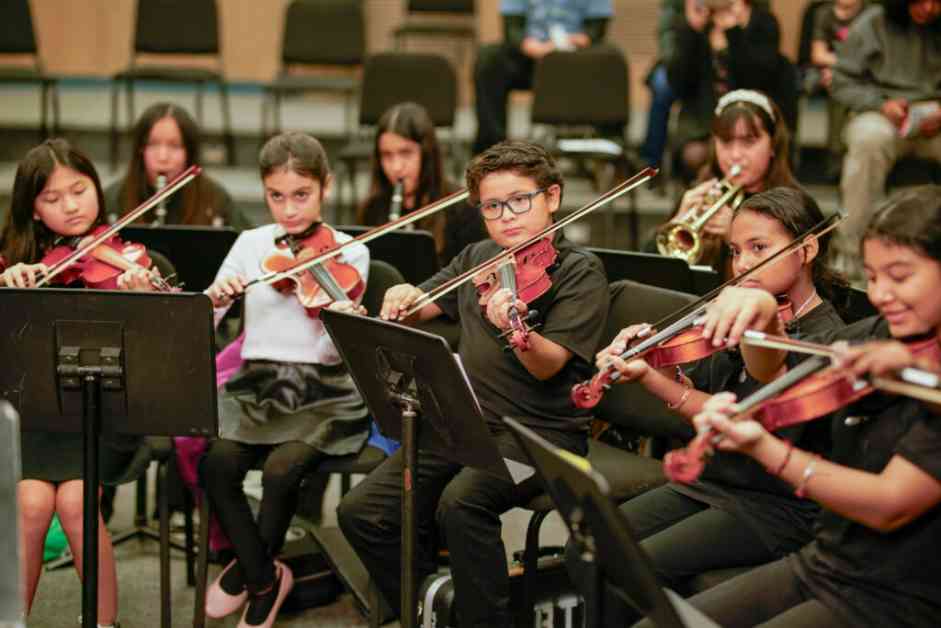The Harmony Project in Los Angeles is offering free music education to low-income children, providing them with a life-changing opportunity to explore the world of music. Rigoberto Sanchez-Mejia, who started taking music lessons at the Harmony Project at the age of 5, found his passion for the violin and credits the program with introducing him to the world of music. Now 17 years old, Sanchez-Mejia is planning to study biochemistry at UC San Diego in the fall, showcasing the impact that music education can have on a student’s academic and personal development.
Harnessing the Power of Music for Success
Sanchez-Mejia’s journey with the violin is a testament to the transformative power of music education. For many low-income students served by the Harmony Project, receiving their first instrument is not only emotionally stirring but also life-changing. Amid the youth mental health crisis exacerbated by the pandemic, music has been a source of solace and intellectual enrichment for these students. Sanchez-Mejia shares that playing the violin helps calm his mind and allows him to focus amidst the chaos, highlighting the therapeutic benefits of music.
The Harmony Project, the largest nonprofit music education organization in Los Angeles, serves students from areas like Los Angeles Unified (LAUSD), Compton, and South Central, boasting an impressive 97% high school graduation rate. Despite facing obstacles related to poverty, roughly 79% of Harmony Project participants become first-generation college students, showcasing the program’s effectiveness in paving the way for higher education and beyond.
A Holistic Approach to Music Education
Founded by Margaret Martin in 2001, the Harmony Project aims to provide children from underserved communities with access to free music education as a public health intervention. The program’s core belief in the cognitive benefits of music education has been supported by research, with neuroscientist Nina Kraus studying how music lessons can enhance brain function and academic success. By giving children in poverty an early cognitive boost through music, the Harmony Project sets them on a path towards a brighter future.
With over 4,000 students enrolled in the program, the Harmony Project utilizes a research-backed approach to arts education that leverages the neuroscience of music to spark learning. Playing an instrument not only enhances language skills but also strengthens the brain’s capacity for literacy, unlocking the full potential of students’ cognitive abilities. The program’s emphasis on discipline, persistence, and commitment helps students develop essential skills that extend beyond music into other academic pursuits.
Fostering Community and Wellness
In addition to providing free music classes and instruments, the Harmony Project offers social services to students, including access to mental health care and food assistance. The program’s holistic approach extends beyond music education, focusing on the overall well-being of students and their families. During the pandemic, Harmony Project worked to support families by providing whatever resources they needed, recognizing the challenges faced by underserved communities.
Executive Director Natalie Jackson emphasizes the importance of building trusting relationships with students and families, noting that the program is committed to supporting children throughout their entire childhood. Despite the learning loss experienced by many students during the pandemic, the music lessons offered by the Harmony Project have helped them catch up and continue their academic and musical growth.
Empowering Youth Through Music
Guillermo Tejeda, a jazz musician and educator, commends the Harmony Project for its immersive approach to music education and community outreach. The program’s emphasis on discipline, personal growth, and academic success has inspired educators like Tejeda to incorporate similar principles in their work. By providing underprivileged children with opportunities to learn and connect through music, the Harmony Project empowers youth to reach their full potential.
Merryl Goldberg, a music and arts professor at Cal State San Marcos, praises the Harmony Project for its compassion and commitment to building healthy communities. By fostering trusting relationships and supporting students holistically, the program creates a nurturing environment where children can thrive academically and personally. The combination of rigor, research, and empathy forms the foundation of the Harmony Project’s success in helping students achieve their goals.
Looking Towards the Future
As Rigoberto Sanchez-Mejia prepares to embark on his college journey, he reflects on the impact of the Harmony Project in shaping his future. Despite choosing a science major for practical reasons, Sanchez-Mejia plans to continue playing the violin and pursuing his passion for music. His experience with the Harmony Project has not only prepared him for college but has also instilled in him a lifelong love for music and a sense of dedication to his craft.
In an age of distraction, the ability to sustain concentration through musical training has been shown to enhance scholastic achievement. Sanchez-Mejia’s dedication to the violin, his involvement in the youth orchestra, and his academic success are a testament to the profound impact of music education on students’ overall development. As he looks ahead to his college years, Sanchez-Mejia remains grateful for the opportunities and support provided by the Harmony Project, which has played a pivotal role in shaping his trajectory towards a bright and promising future.




















